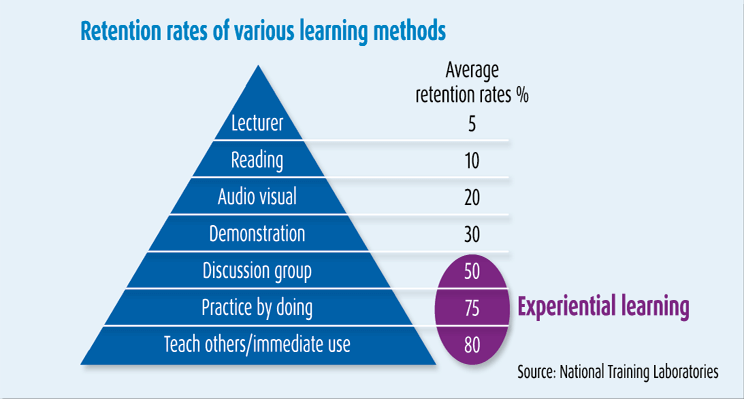In this white paper we explore three universal challenges every business faces and show how progressive intuitive teams can be nurtured through the use of effective experiential learning; learning by doing.
 Research by the National Training Laboratories (Kolb’s learning cycle) suggests passive learning models like presentations drive only 5% retention. Briefings, ‘all hands meetings’, e-mail communications and many types of webinar and e-learning are passive forms of learning. They don’t encourage teams to interact, perform, make mistakes, reflect and learn new competencies and behaviours together.
Research by the National Training Laboratories (Kolb’s learning cycle) suggests passive learning models like presentations drive only 5% retention. Briefings, ‘all hands meetings’, e-mail communications and many types of webinar and e-learning are passive forms of learning. They don’t encourage teams to interact, perform, make mistakes, reflect and learn new competencies and behaviours together.
Conversely, experiential learning more effectively engages participants in “practising by doing” driving at least 75% retention. Methods that embrace experiential learning include management games and business simulations.
We define these as:
“devices through which individuals learn about how businesses and organisations work, enabling performance improvement, through the development of business and/or interpersonal skills”.
Experiential learning fast-tracks the development of new behaviours driving agile, decisive businesses, helping managers develop the skills they need to lead effectively. It enables teams to meet, get to know each other and work out a common purpose together.
The three common challenges faced by 21st-century organisations we examine are
- Breaking down silos. Something almost everyone who has worked in a large organisation will have experienced.
- Viewing compliance and an enabler, not a hurdle. If people understand why regulations and rules exist then getting ‘buy-in’ and support is a lot easier!
- Improving sales performance through shared learning experiences. Every organisation needs to acquire new customers and as the marketplace changes the sales techniques and the management skills required for a team to meet its targets needs to change to meet customer demands.
Read the full white paper ‘Experiential learning: Why learning by doing builds agile, supportive organisations‘ or take a look at the book Gamification for Business which looks at more obstinate organisational challenges.

